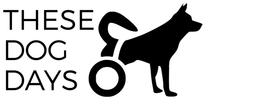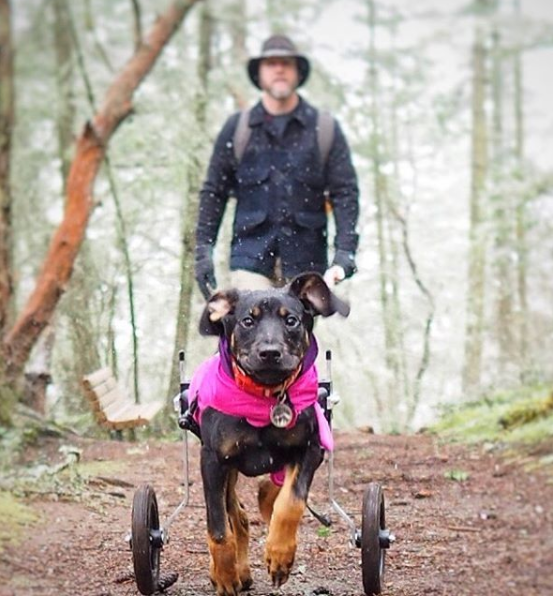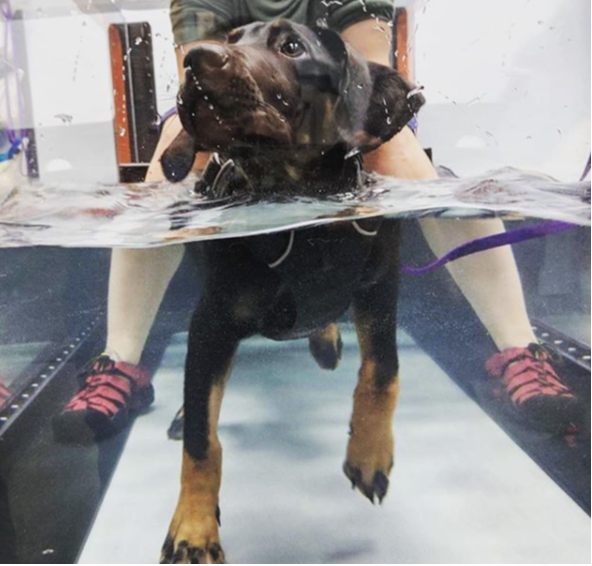|
2/23/2018 0 Comments NoodleThis is Noodle. Noodle is a young pup, still less than a year old, living in Mount Vernon, USA. She was adopted in December 2017 by Bree and Kyle, the happy pup parents, after hearing about her through social media and local Seattle news. Noodle was a stray and was brought to the local shelter with a spinal cord injury at level of L2. Very little is known about the cause of Noodle's injury other than the doctor believes it was trauma not congenital (at birth). Bree and Kyle are doing all they can to give Noodle the best chance of recovery including a neurology consult for Noodle, pending MRI and pursuing doggy physical rehab. She appears to be incontinent though she does wake us up at night with a whimper when she has to go. The sensation in her back legs is limited to nonexistent. She has high tone and spasticity, meaning though she is paralyzed, those back legs like to twitch and kick. This tone allows her to occasionally kick up to a standing position. Especially during her favorite time of day - meal time! Describe and normal day with Noodle My husband and I both work. Noodle wakes us up around 5-5:30 am. We express her bowel/bladder immediately and then she is in her cart to burn some energy before we go to work. She usually eats around 6:30 am. Express again at 7 am then we leave for work. Between my husband and I, one or both of us are able to come home at lunch for an hour. We help Noodle use the restroom and then we usually go for a walk in her scooter, play fetch, or tug of war - weather permitting. Evening time, we are home by 4:30pm. Guess what? We help her use the restroom again. Play, play, play! She is a puppy still despite her injury. Walk, eat, potty, play and then cuddle down for bedtime. How do you spend your weekends? Weekends we try to adventure! My husband and I are always on the go. We live in a beautiful state that offers so many outdoor adventures. We have started introducing Noodle to hiking. She has taken weekend trips to Baker Mountain, Suncadia, and the Olympic Peninsula. Soon we will be adding a ferry trip to Orcas Island on her list of journeys. Where we go, she goes, just like any of our other dogs. What products, tips or tricks would you recommend? Washable diapers, dog bed covers, and pee pads are very important to us. We hated the amount of trash we were creating with disposable items. Earthbath shampoo and grooming wipes have been so good to Noodle's skin. She obviously requires extra cleaning and it does not seem to dry out her skin. Ruffwear webmaster harness. This company is rock solid. We've always used their collars/leashes with our other dogs. This harness has good support and a handle about mid back. The handle works great for assisting her over curbs, rocks, downed limbs while in her scooter. What advice would you offer someone who has a dog in a similar situation? Scheduling is key! Not your schedule, theirs. When she needs to go potty, she needs to go. Preemptively taking her out to use the restroom can save you the trouble of accidents in the house. Regular and consistent toileting is referred to as a bowel and bladder program. This is how humans with spinal cord injuries avoid frequent urinary tract infections and bowel issues. Doing the same for your paralyzed pooch is important. Furthermore, your dog will continue to be happy, adventurous and fulfilled. That is the beauty of dogs. They keep perservering and find new ways to reach their goals. Humans always learn from their dogs and learning from a paralyzed dog has helped us in our personal life and in our careers as physical therapists. So the take home message, a dog with a disability will continue to inspire and love you just like an able bodied dog. We often think we save dogs but I believe it is the other way around. Follow up on the progress of Noodle's treatment and adventures on Instagram or at noodsterscootster.com
0 Comments
Leave a Reply. |
Search or select topicsAll Acupuncture Arthritis Bladder Management Blindness Bowel Management Cerebellar Hypoplasia Deaf Degenerative Myelopathy Diabetes Diet Electro Stimulation FCE Genetic Disorder Grooming Hemivertebrae Hydrotherapy Incontinence IVDD Laser Therapy Limb Amputation Limb Deformity Paralysis Physical Therapy Rescue Spinal Injury |
Search by typing & pressing enter


